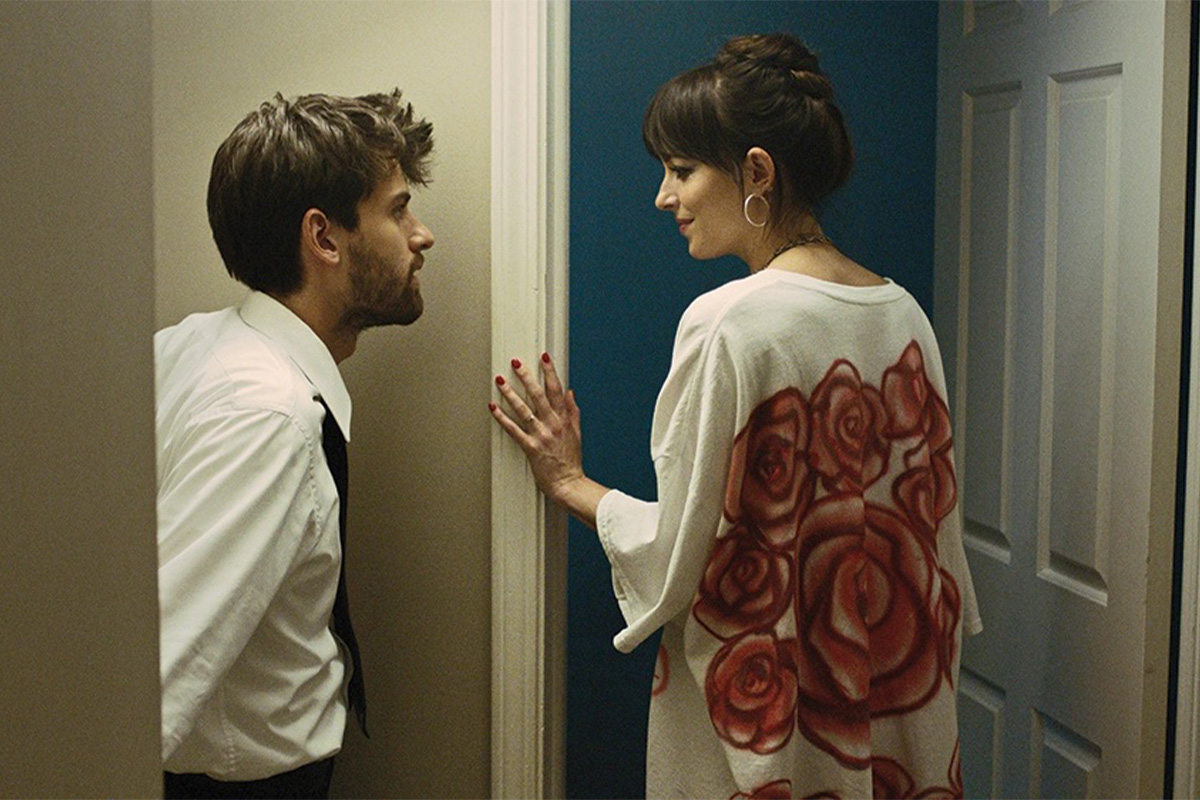Cooper Raiff’s new film “Cha Cha Real Smooth” is, on the surface, not a Jewish movie. A coming-of-age tale, it follows protagonist Andrew (played by Raiff) after his college graduation, jobless and aimless, moving back into his mom’s house and sleeping on the bedroom floor of his little brother David. As David’s de facto chaperone, Andrew winds up accompanying him to the bar mitzvah parties of his classmates, where he discovers his penchant for “party starting,” or being the hyped-up DJ and games master who corrals all the kids to the dance floor, makes the party games look cool and generally keeps the peace among bickering parents. Though at first I thought the plot could be leading up to David’s own bar mitzvah, it turns out Andrew and his family are not Jewish themselves; their New Jersey suburb is just home to many Jewish families.
“Cha Cha Real Smooth” has an obvious juxtaposition at its core: The fumbling manhood of a 22-year-old basking in the monotony of post-grad life is contrasted with ceremonies marking the adulthood of tiny brace-faced middle schoolers. Though the film has received some backlash for the wish fulfillment aspect of its writer-director-protagonist — Raiff casts himself as a charming man who catches the eye of three different women throughout the film, is adored by his mom and brother and is so much better with kids than any actual 22-year-old — “Cha Cha Real Smooth” makes it clear that Andrew is not all fun and games. He drinks on the job. He insults parents, sometimes on purpose and sometimes not, and eventually causes a fist fight among party attendees. He’s a jerk to his stepdad (actual Jewish dad Brad Garrett) for no apparent reason. And he projects a romantic fantasy onto young mom Domino (Dakota Johnson), only to be crushed by the revelation that she has a life outside his naïve vision.
Much of the film’s plot revolves around the relationship between Andrew and Domino, the mother of David’s classmate Lola (Vanessa Burghardt), who is bullied because of her autism and her advanced age compared to her classmates. Though former high school popular girl Macy (Israeli actor Odeya Rush of “Lady Bird”) develops a crush on Andrew, he prefers the company of the older Domino, growing closer to her and imploring her to leave her fiancé while juggling a job as Lola’s babysitter. Criticism around this relationship — why would a beautiful mom in her 30s be attracted to a bumbling 20-something? — seems to miss the insight that Domino acts out due to her fear of commitment. Her desire to do something bad and see if she can get away with it is stronger than her desire for Andrew specifically.
Other criticism has focused on the depiction of the b’nei mitzvot in the film, and the fact that neither Raiff nor his characters are Jewish. Why is Judaism in the film filtered through the eyes of non-Jewish characters? This is a valid line of questioning, but as a Jewish person who didn’t have a bat mitzvah and who was both jealous of my peers and confused by the lavishness of their parties, I found that “Cha Cha Real Smooth” waded into the murky waters of the contemporary b’nei mitzvah, a religious ritual often associated with commodification, in a relatable way. Critic Shayna Maci Warner writes that Judaism in the film is used as “a backdrop” rather than a set piece. It’s true that the film lacks the tenderness of comedies like “Shiva Baby” or the tongue-in-cheek quality of “A Serious Man.” A scene where the bar mitzvah boy lights his candles, calling up friends and family to honor them, hits Andrew and Domino hard in its beauty and warmth; though the scene felt genuine and affirming to me, the subsequent line that Andrew and Domino both sometimes “envy” Judaism, as Warner points out, is rather obnoxious. (Who hasn’t been told by a non-Jewish friend that they always wished they could have a bar mitzvah?)
The movie, which Apple TV+ just purchased for a whopping $15 million in the wake of its Sundance premiere, may treat Judaism and Jewishness as the background noise humming through everyday suburban life. But the film, which features a worthwhile buffet of affecting performances, also speaks to the way that American Judaism’s emphasis on the b’nei mitzvah and its accompanying grandiose party can make the religious aspects of young Jewishness feel like a footnote, too. Perhaps this is an unwelcome insight from a non-Jewish filmmaker, but for me, that doesn’t negate its uncomfortable truth.



